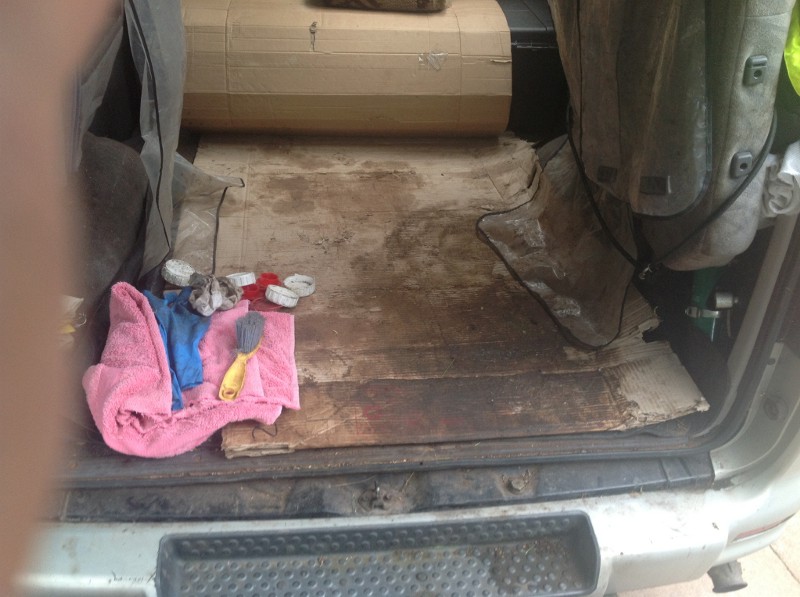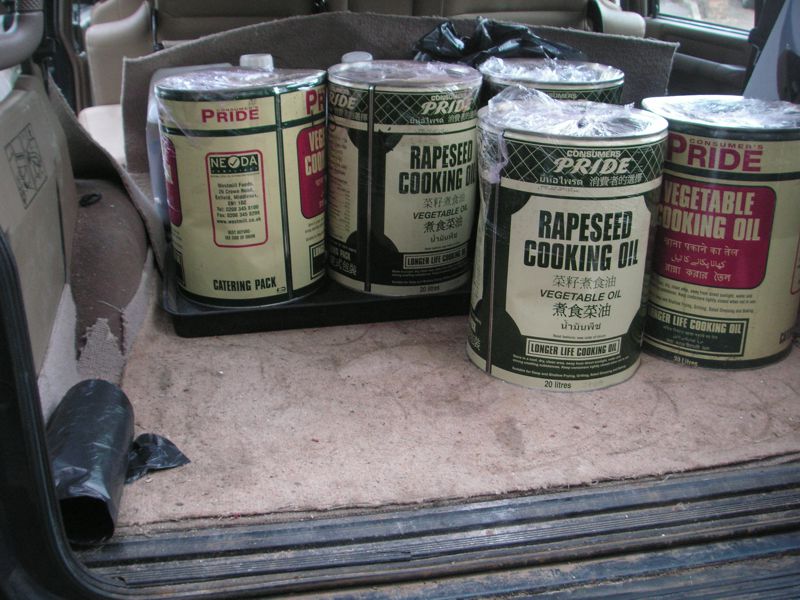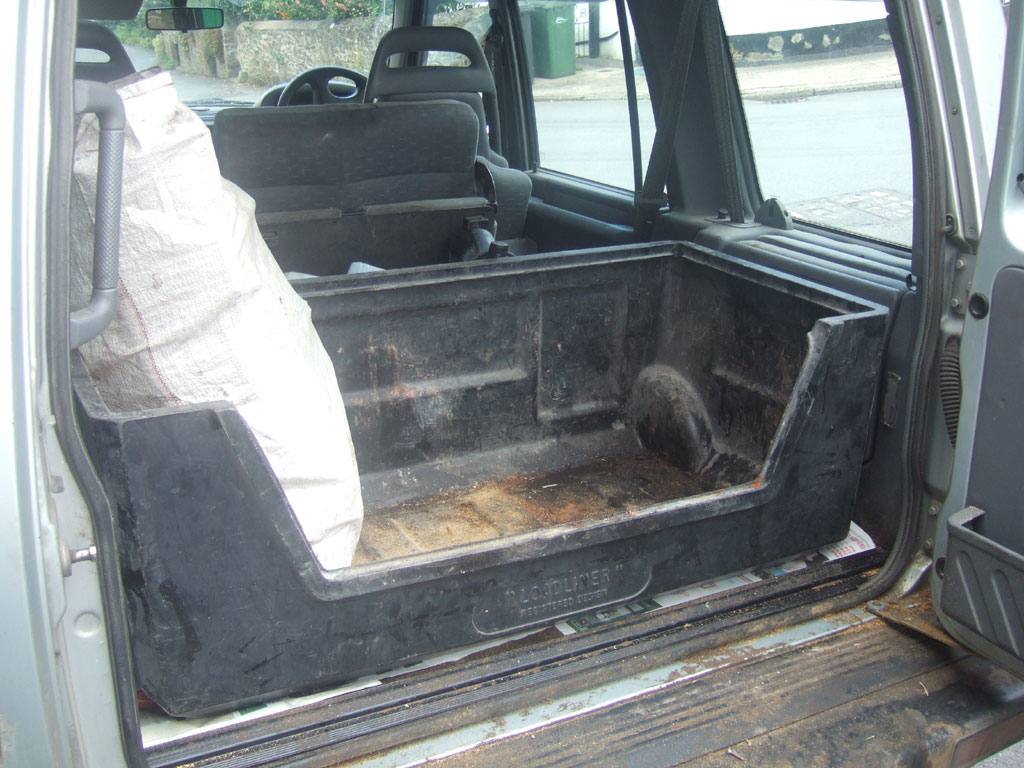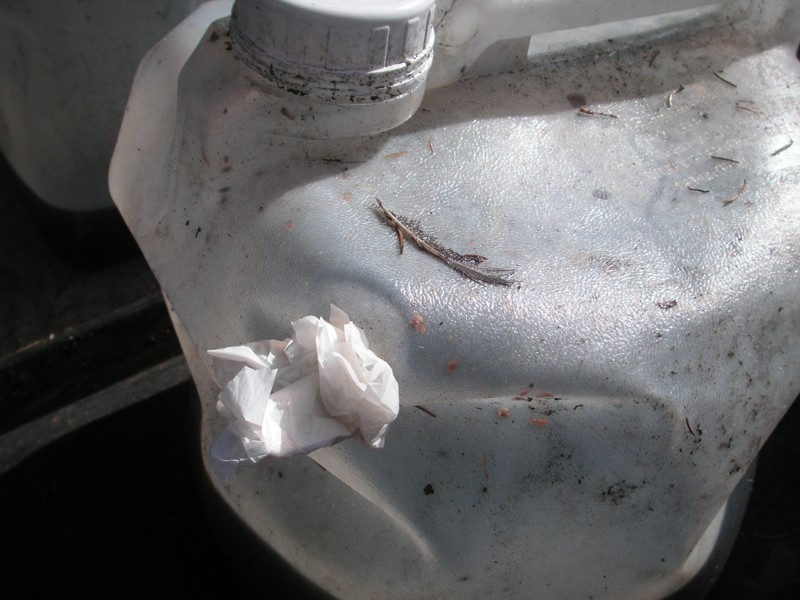Difference between revisions of "Oil collecting made a little easier"
m (Julian moved page Oil collecting made a little easer to Oil collecting made a little easier: Correcting my poor spelling) |
|||
| (9 intermediate revisions by the same user not shown) | |||
| Line 3: | Line 3: | ||
'''This page is work in progress!''' | '''This page is work in progress!''' | ||
| + | One of the most onerous tasks in making biodiesel or running a car on vegetable oil is that of collecting oil. Most suppliers don't consider the onward transport of their waste oil and often leave the home brewer to collect messy, unsealed containers in the family car. This page details various methods members use to combat the problem. | ||
| + | First on the list should be education. It's in the suppliers interest to keep the storage area clean as an inspection by the environmental health authorities will take a poor view of leaking and overflowing oil storage due to vermin issues. This should be second nature to a food outlet but many don't care and no matter how many times you explain the importance. Doing what you can to keep the storage area clean will go a long way to securing your oil supply, for example removing spent containers if they don't have a disposal route. | ||
| + | |||
| + | |||
| + | ------------------------------ | ||
Don't forget the towel and old kitchen spray bottle full of soap/water mixture for cleaning your hands, works a treat and you can hang the spray bottle up in the back of the car using the handle. | Don't forget the towel and old kitchen spray bottle full of soap/water mixture for cleaning your hands, works a treat and you can hang the spray bottle up in the back of the car using the handle. | ||
| Line 37: | Line 42: | ||
------------------------------------ | ------------------------------------ | ||
| − | + | If you've got an estate car you can make a couple of nice big boot liners or bunds by cutting about a foot off of each side of an IBC bottle. | |
| + | |||
| + | |||
| + | --------------------------------- | ||
| + | |||
| + | For hand cleaning I carry a packet of baby wipes | ||
| + | all so some spare cubey lids | ||
| + | |||
| + | ---------------------------------- | ||
| + | |||
| + | Cling can also be wrapped around groups of tins (etc) to stop them falling over. | ||
| + | |||
| + | -------------------------------------- | ||
| + | If you have to decant oil from a large barrel to more managable containers, spread a plastic sheet on the ground before you start. Catching oil on the sheet and discarding it is far easer than trying to clean up any spills. Idea from womble. | ||
| + | |||
| + | |||
| + | -------------------------------------- | ||
| + | |||
| + | |||
| + | <gallery caption="Photos probably best explain the various ideas used by members when collecting and storing oil" widths="450px" heights="350px" perrow="2" align="center"> | ||
| + | |||
| + | File:Seed tray for cans.JPG|While a propitiatory boot liner may be better, a cheap and convenient alternative can be had in the form of a seed tray without drainage holes. Available from most large garden centres and probably cheaper on line, it prevents minor spills and containers with dirty bottoms soiling the interior of the car. Several layers of carpet can also assist in soaking up spills before they can do any damage. | ||
| + | |||
| + | |||
| + | File:Dick oil collecting 1.jpg|Cardboard is also an excellent absorbent for vegetable oil and can be disposed of or used as fire, bar-b-que, or log burners lighters after use. Source: Dickjotec. | ||
| + | |||
| + | |||
| + | File:Prep tub lid being cut.jpg|A major problem with oil suppliers is that they have a habit of piercing the tops of 20 ltr tins to prevent "glugging" when filling fryers. It works well but leaves the tins unsealed. If stored outside, rain can collect within the top rim and drain into the can. This leaves us with the problem of removing the water and, in extreme cases can lead to the tin overflowing. As oil floats on water, the water collects in the bottom lifting the oil out of the tin and creating a mess in the storage area. | ||
| + | |||
| + | |||
| + | File:Prep tub lid.JPG|To prevent this a palm oil tub can be cut down to form a lid, keeping water, leaves and other detritus off the top of the drum. Unfortunately the base diameter of 20 ltr tins is slightly larger than the top and a tin won't sit squarely in a tub, but if nothing else is available, the cut down tubs could be used as drip trays for transportation, but check the stability before driving off! | ||
| + | |||
| + | File:Cling film tins.JPG|A great idea to deal with pierced tins from julianf is to wrap cling film round the top of the tins. This can be gathered over the top of the tin to form a surprisingly effective seal. | ||
| + | |||
| + | File:Cling film closeup.JPG|Even tins that have been hacked open can be sealed in this way. The example shown was driven over quite bumpy roads with no spills. | ||
| + | |||
| + | File:Dick oil collecting 3.jpg|If you provide drums for your suppliers to fill, a dipstick can be constructed to ascertain the volume of oil in a part filled drum. Source: Dickjotec. | ||
| + | |||
| + | |||
| + | File:Dick oil collecting 2.jpg|This example shows tie wraps at known intervals fixed to the dipstick. With this method there can be no disagreement as to the quantity of oil paid for or what should be entered on the [[Environment Agency and waste transfer notes|WTN]]. Source: Dickjotec. | ||
| + | |||
| + | |||
| + | File:Stacked cubies - Keef.jpg|An ingenious method of safely stacking cubies has been devised by Keef. An old IBC frame can be used in conjunction with cross slats and sheets of, in this case polycarbonate roofing, but plywood or MDF would work just as well. This method can store 36 full cubies in the footprint of an IBC without any of them being crushed. Source: Keef. | ||
| + | |||
| + | |||
| + | |||
| + | |||
| + | </gallery> | ||
| + | |||
| + | |||
| + | |||
| + | |||
| + | |||
| + | ----------------------------------- | ||
| − | |||
| − | |||
[[File:Dick oil collecting 1.jpg]] | [[File:Dick oil collecting 1.jpg]] | ||
| − | |||
| − | |||
| − | [[File: | + | [[File:Carpet in car.JPG]] |
| + | |||
| + | |||
| + | [[File:Loadliner.jpg]] | ||
| − | |||
| − | |||
| − | [[File: | + | [[File:Cubie_damage.jpg]] |
Latest revision as of 12:43, 14 March 2014
This page is work in progress!
One of the most onerous tasks in making biodiesel or running a car on vegetable oil is that of collecting oil. Most suppliers don't consider the onward transport of their waste oil and often leave the home brewer to collect messy, unsealed containers in the family car. This page details various methods members use to combat the problem.
First on the list should be education. It's in the suppliers interest to keep the storage area clean as an inspection by the environmental health authorities will take a poor view of leaking and overflowing oil storage due to vermin issues. This should be second nature to a food outlet but many don't care and no matter how many times you explain the importance. Doing what you can to keep the storage area clean will go a long way to securing your oil supply, for example removing spent containers if they don't have a disposal route.
Don't forget the towel and old kitchen spray bottle full of soap/water mixture for cleaning your hands, works a treat and you can hang the spray bottle up in the back of the car using the handle.
Now I also always carry a big funnel and a jug with me. It's got me out of trouble so many times.
A simple trick to seal a can if the red plastic lid is missing is to push out the spout with a blunt instrument (screwdriver), put a bit of clingfilm over the hole and then pop the spout back in.
For years I struggled with storing cubies because they won't stack and if you try, they crush and oil gets forced out all over the floor. So I came up with this method that means you can store 36 full cubies in the footprint of an IBC without any of them being crushed. Each layer is supported by four lengths of 40x40mm timber with a sheet of polycarbonate on top
This is the collection kit, card on floor, rubber gloves, towel, spare tops, bin bags.
This is two views of the contents stick. It fits in e drum and is marked with cable ties. For the places that find English hard I leave a card showing how much I pay for the quantities then it is easy to show them the level on the stick and the amount that it equates to
Carrying a kit of old tops, caps and bungs for when the supplier has lost them. Oh, and loads of carpet off cuts over the top of plastic in the boot/load space work well.
I have a hard boot liner in the back of the disco, with a bit of sawdust in the bottom of it - just stops evreything getting sticky (id rather dusty than sticky any day)
I have thick cardboard in the back of the truck, it soaks oil and is easy to chuck out. I have a Bungy that I fix round the drums to stop them moving around. I fix the top to a clamp ring of the clip tops I leave with a piece of thin chain so, hopefully, they don't forget to put it back on. I leave a stick in the drum calibrated in litres to avoid any disagreement on quantity. Most important, IMO, is some old towels and a bin bag to clean up if I spill some oil in their store. Oil soaked card is brilliant for starting fires. Dick
If you've got an estate car you can make a couple of nice big boot liners or bunds by cutting about a foot off of each side of an IBC bottle.
For hand cleaning I carry a packet of baby wipes all so some spare cubey lids
Cling can also be wrapped around groups of tins (etc) to stop them falling over.
If you have to decant oil from a large barrel to more managable containers, spread a plastic sheet on the ground before you start. Catching oil on the sheet and discarding it is far easer than trying to clean up any spills. Idea from womble.
- Photos probably best explain the various ideas used by members when collecting and storing oil
While a propitiatory boot liner may be better, a cheap and convenient alternative can be had in the form of a seed tray without drainage holes. Available from most large garden centres and probably cheaper on line, it prevents minor spills and containers with dirty bottoms soiling the interior of the car. Several layers of carpet can also assist in soaking up spills before they can do any damage.
A major problem with oil suppliers is that they have a habit of piercing the tops of 20 ltr tins to prevent "glugging" when filling fryers. It works well but leaves the tins unsealed. If stored outside, rain can collect within the top rim and drain into the can. This leaves us with the problem of removing the water and, in extreme cases can lead to the tin overflowing. As oil floats on water, the water collects in the bottom lifting the oil out of the tin and creating a mess in the storage area.
To prevent this a palm oil tub can be cut down to form a lid, keeping water, leaves and other detritus off the top of the drum. Unfortunately the base diameter of 20 ltr tins is slightly larger than the top and a tin won't sit squarely in a tub, but if nothing else is available, the cut down tubs could be used as drip trays for transportation, but check the stability before driving off!
This example shows tie wraps at known intervals fixed to the dipstick. With this method there can be no disagreement as to the quantity of oil paid for or what should be entered on the WTN. Source: Dickjotec.
An ingenious method of safely stacking cubies has been devised by Keef. An old IBC frame can be used in conjunction with cross slats and sheets of, in this case polycarbonate roofing, but plywood or MDF would work just as well. This method can store 36 full cubies in the footprint of an IBC without any of them being crushed. Source: Keef.












